Chicago has had the longest streak of above-normal daily temperatures in any November since records have been kept:
The last day of November will see Chicago's 27th record-setting consecutive day with above-normal temperatures. Warmer readings are likely Tuesday as southwesterly winds and abundant sunshine allow afternoon high temperatures to approach and even exceed 50 degrees at many observation points around the metro area. A cold front should pass through Chicago early Wednesday, followed by a sudden turn to colder weather with falling temperatures.
In practice, this means that November felt like October, which, because of the 20 days of below-normal temperatures that month, felt like November. The forecast calls for a normal December, and who-knows-what in 2010.
Tomorrow we look forward to the correction: after the day's high of 11°C at midnight, a slow slide to -2°C before the snow pushes in on Wednesday. Yummy.
It looks like I might fly this afternoon:
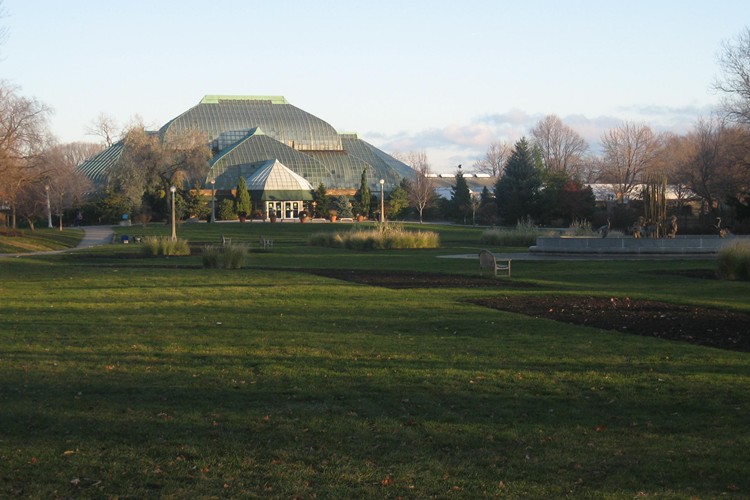
I've had to postpone my annual flight review four times because of weather. Finally, today, the forecast calls for what you see above: clear skies, light winds, cold temperatures. (It's 0°C this morning.)
As usual, the primary color is gray:
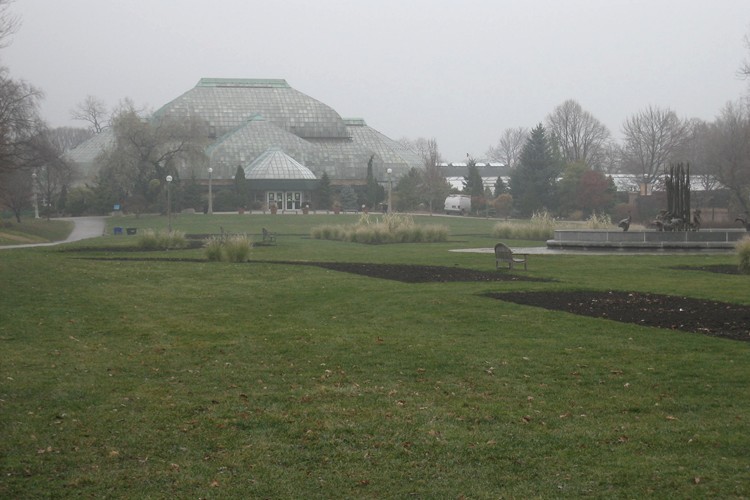
There's a rumor we will have sunlight tomorrow. Unconfirmed.
Carl Kasell is retiring December 30th:
Kasell will, however, continue as official judge and scorekeeper of the Chicago Public Radio-produced quiz program, "Wait Wait … Don't Tell Me!," "the show that turned him from a newsman into a rock star," as noted in a memo to staff Monday from David Sweeney, NPR's managing editor for news, and Margaret Low Smith, its vice president of programming.
Sigh.
My cousin sent me this example of...something...but I couldn't stop laughing:
Remember how I mentioned packing for two out of the three climates I expected to encounter on this trip? I should note that I expected London to be warmer than Chicago. I also expected that I would only be outside in Chicago traveling from the O'Hare tram to my car, and my car to my apartment.
I'm debating finding a wollens store and buying a good, heavy, Scottish sweater.
Our next residency lets me do the same thing only moreso, when I get to go from Chicago to Delhi, India, at the end of January. At least I'll have a heavy coat, gloves, and a hat with me on the trip. One of my classmates mentioned how cold Delhi gets in winter, but I think she meant "relative to summer" and not "relative to what anyone else would consider cold."
This isn't a complaint, of course. In Chicago, if you complain about any temperature warmer than, say, -20°C, you're just whining. So I'm not complaining. I'm just acknowledging that I'm dressed inappropriately for the weather.
Bonus photo from half an hour ago. I'm definitely not in Dubai anymore:
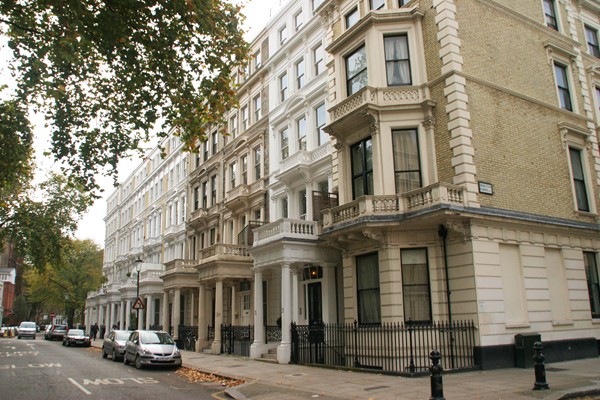
I've stopped in London for a day and a half to get my bearings and ease the transition back to real life. Also because it was less expensive than changing my return flight to the U.S. or staying one more night in Dubai.
Some observations:
- This isn't your granddad's British Airways. The flight from Dubai landed early, and the flight's bags got to the carousel before the passengers. Yes, you say, because British immigration takes forever. No! I say, because from the plane stopping at the gate (in their spanking-new Terminal 5) to baggage claim took me 20 minutes. You can't even get from the gate to immigration at O'Hare Terminal 5 that fast.
- While walking around South Kensington last night, I heard a weird snapping sound across the street from me. It turned out a fox was trying to remove a windshield wiper from a car. I must have spooked it because it jumped off the car and scooted into a nearby shrubbery when I looked at it. South Kensington is right smack in London's Zone 1—equivalent (in many ways) to Lincoln Park in Chicago, or the West Village in New York. You don't expect to see foxes in dense residential neighborhoods just like you don't expect to find coyotes in the drink cooler at a downtown Chicago Quizno's.
- In Dubai you might see a shawerma restaurant next to a Lebanese restaurant, both with Arabic signs. In London last night I saw a shawerma place next to a Lebanese place, both with Arabic signs, but with a wine shop between them. That you don't see in Dubai.
- Right now it's 34°C in Dubai, 4°C in London, and 14°C in Chicago. Good thing I packed for two out of three climates.
I am now off to explore this area of London, once I work out what day, time, and month it is.
Dubai has tall buildings. Many of them. Like our hotel, the Jumeirah Emirates Towers:
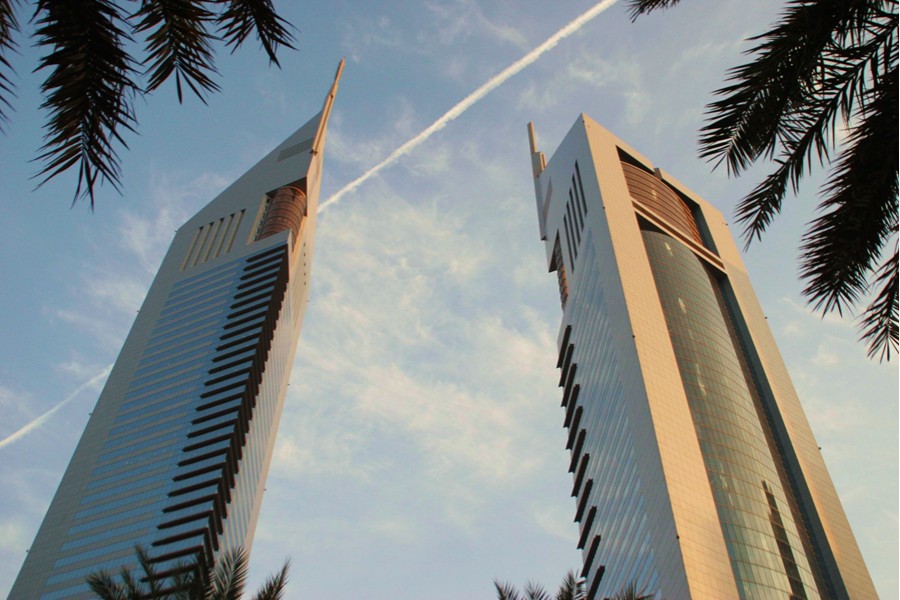
The 51-story hotel is 309 m tall, about the height of the Chrysler Building.
But that's not the tallest building here. No, from my hotel window I can see this:
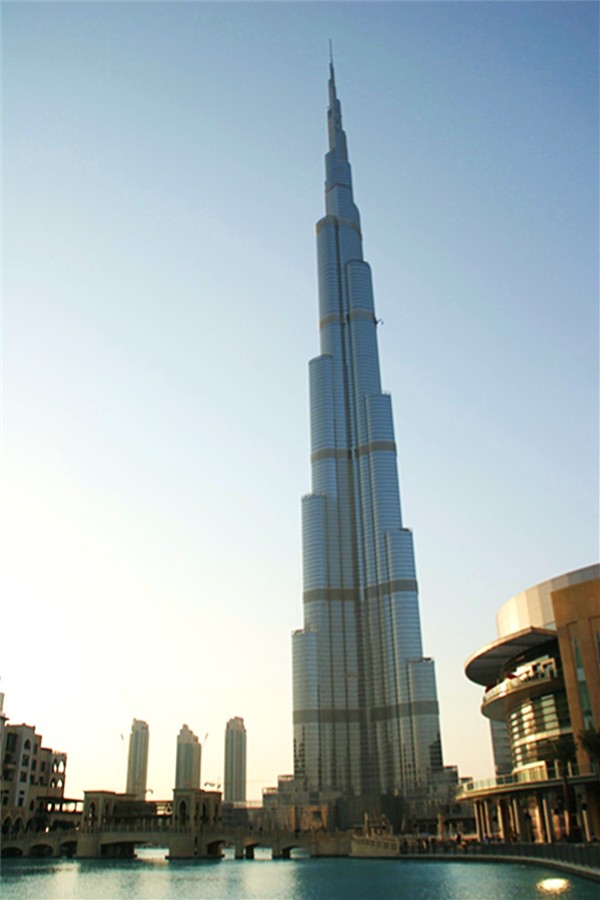
That's the Burj Dubai, which at 818 m is almost double the height of Sears Willis Tower back home. Here's a comparison (from Wikipedia):
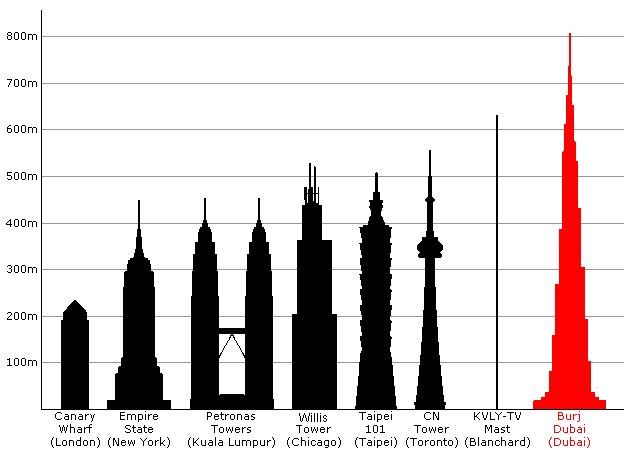
I'm working on an essay (not explicitly for the CCMBA) about Dubai's growth, including its monumental projects like the Burj, and what that may say about its future. Later though; right now I'm exhausted.
Chicago Tribune transport columnist John Hilkevich is shocked—shocked!—this morning to find that Chicago parking tickets are up 26% this year:
The stepped-up enforcement contributed to a $7 million year-over-year increase in parking ticket revenue, which totaled $119.2 million from January through August, the Chicago Department of Revenue reported.
Fines assessed from tickets go to the city's nearly depleted general fund. Revenue collected from a four-fold increase in parking rates this year is kept by Chicago Parking Meters LLC, which paid the city $1.15 billion as part of a 75-year lease to manage on-street parking.
The extra emphasis on enforcement may be contributing to an abundance of parking spaces in many parts of the city where finding street parking was previously luck of the draw.
The clampdown also is discouraging some suburbanites and others to limit their trips to the city.
Discouraging? No kidding. I'm in North Carolina this weekend, where I took advantage of a clothing sale I could have gone to at the same store in Chicago, because even N.C.'s 7.5% sales tax is better than downtown Chicago's 10.5%. (Maine was just too far to go for one suit.)
Mayor Daley fils has done some great things for Chicago, but the biggest things—privitization of public assets, unbelievable taxation, etc.—threaten his legacy. Perhaps now that we don't have the distraction of the 2016 Olympics anymore, he'll turn his energies toward making the city more financially livable again.
The state of Illinois mysteriously doubled its funding request for upgrading the Chicago-St. Louis rail corridor to handle moderately-high-speed trains. First, of the $4.5 bn now requested, only $1.2 bn will go to the actual track upgrades; the state now wants additional funds to build a second track along the route. Second, the upgrades will increase the route's top speed from 126 km/h to only 176 km/h, not exactly a serious rival for other HSR projects worldwide (like, for example, Shanghai's MagLev, which has hit 501 km/h, or France's TGV which routinely travels at 320 km/h.)
Here's Crain's:
"The state's plan is not high-speed rail," says Richard Harnish, executive director of the Midwest High Speed Rail Assn., which advocates a new, 350 km/h Chicago-St. Louis route. "Four hours doesn't change a lot. It's not transformative. What is transformative is two hours."
That would cost $12 billion to $13 billion, he estimates, in line with a detailed, 256-page proposal for a complete Midwest high-speed rail system centered on Chicago that French National Railways, known by its French acronym, SNCF, filed recently with the Federal Railroad Administration.
... With Chicago's status as the nation's rail hub, the state's longtime subsidization of passenger rail and its unprecedented clout with the Obama administration, Illinois is considered likely to get a big chunk of the $8 billion in federal stimulus funds for high-speed rail to be disbursed soon, plus billions more expected in future years as Congress embraces one of the president's top priorities
Is it worth billions to improve rail traffic between Chicago, Milwaukee, St. Louis, and Detroit? I don't think there's an objectively correct answer, but I vote yes. The European experience of moving more people more cheaply (and more quickly) by rail than by air, with significantly lower greenhouse gas emissions, shows that HSR can make a huge difference in a region. But Europe makes different choices than the U.S., and in a democracy it's permissible for one population to decide that its quality of life has a higher price than for another.
Still, two hours to St. Louis? Thirty minutes to Milwaukee? That would be cool.